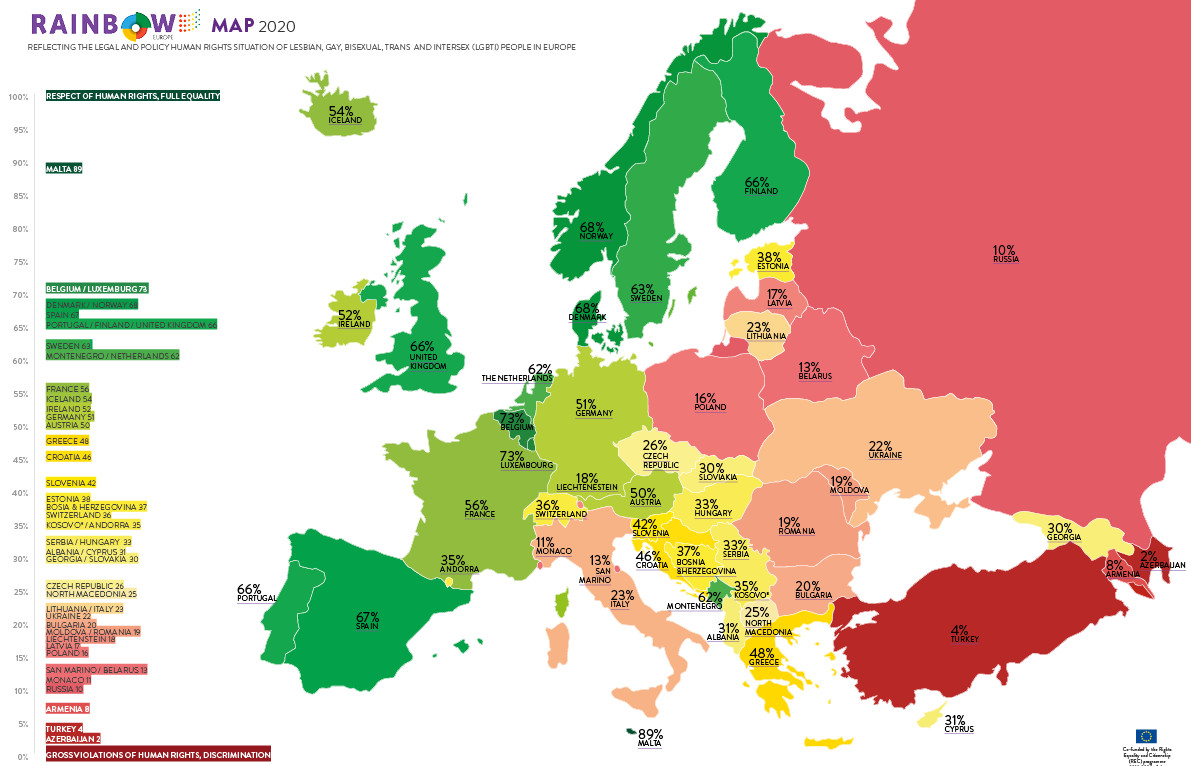The annual Rainbow Map ranking has named Poland, Russia, Turkey and Azerbaijan as some of the worst countries to be LGBT+ in Europe, while the UK continues to slide down the rankings.
Since 2009, LGBT+ organisation ILGA-Europe has compiled an annual Rainbow Map ranking of the 49 countries in Europe based on each country’s commitment to LGBT+ rights and equality.
In the ranking each country is assigned a percentage point based on its standing in six key areas: equality and non-discrimination; family; hate crime and hate speech; legal gender recognition and bodily integrity; civil society space and asylum.
This year’s list names Azerbaijan as the worst country in Europe for LGBT+ rights and equality with a score of just 2.3 per cent. Other countries trailing behind include Turkey (3.8 per cent), Armenia (7.5 per cent), Russia (10 per cent) and Poland (16 per cent).
Conversely, Malta topped the ILGA-ranking for the fifth year in a row, coming out with an incredible 89 per cent score. It was followed by Belgium and Luxembourg (both 73 per cent), Denmark and Norway (both 68 per cent) and Spain (67 per cent).
UK falls down Rainbow Map rankings because of trans hostility and lack of reforms to GRA.
The United Kingdom finished in ninth place on the Rainbow Map ranking with a score of 66 per cent, having been eighth last year and fourth the year prior. Until 2015, it had been rated the best place in Europe for LGBT+ rights.
The organisation also noted that trans people in the UK are facing “a hostile climate” that is “fuelled by opposition groups”, and are served by a Gender Recognition Act is “not effective in practice”.
Worryingly, the ranking found that there has been no positive change for LGBT+ people in the past year in 49 per cent of the countries polled.
It also found that some countries are continuing to move backwards on LGBT+ rights and protections, a move that first appeared in last year’s index.
Trans and intersex people’s rights are in a state of flux across Europe.
The Rainbow Map index found that trans rights are in a state of flux across Europe — “for better or worse” — and that this is where the biggest shifts are taking place.
Some countries jumped up in the ILGA-Europe ranking this year after they extended essential rights to trans and intersex people. The organisation praised Andorra, Belgium, the Netherlands, North Macedonia, and Switzerland for including gender identity and sex characteristics under equality laws.
Iceland was also praised for introducing new gender recognition legislation and Spain was commended for introducing gender recognition for minors.
However, that progress has not been seen across the board, with gender recognition measures in Albania, Cyprus, Finland and Sweden stalling.
Viima Lampinen, co-chair of the ILGA-Europe executive board, said news that more governments are adopting pro-trans, intersex and non-binary laws should be read with “extreme caution”.

“Targeted attacks on trans rights by opposition groups have been observed in an increasing number of countries across the region, especially transphobic speech fuelled online,” Lampinen said.
“The safety and wellbeing of trans communities in Europe remains precarious and only made more fragile by governments’ responses to the current pandemic, which is affecting these communities particularly hard.”
Some countries are taking ‘active measures’ to target LGBT+ people.
ILGA-Europe executive director Evelyne Paradis said it is “a critical time for LGBTI equality in Europe” and noted that “more and more countries” are falling behind on their commitments to LGBT+ rights.
Furthermore, she said some governments are taking “active measures” to target LGBT+ communities during the coronavirus pandemic.
“History shows that those who are vulnerable before a crisis only become more vulnerable after a crisis, so we have every reason to worry that political complacency, increased repression and socio-economic hardship will create a perfect storm for many LGBTI people in Europe in the next few years,” she said.
ILGA-Europe is calling on governments across Europe to make LGBT+ equality a “high political priority” over the next year.
“The results of this year’s Rainbow Map show that equality measures are falling through the cracks in several countries, not because of lack of political and public support but because of widespread complacency about the need for LGBTI equality measures,” Paradis said.
“Fewer and fewer decision-makers are picking up the mantle to see important pieces of legislation through and keep political momentum, so processes are stalling or not being followed up.
“There are reasons to be extremely worried that this situation will spread as political attention is immersed in the economic fall-out of COVID-19.”
